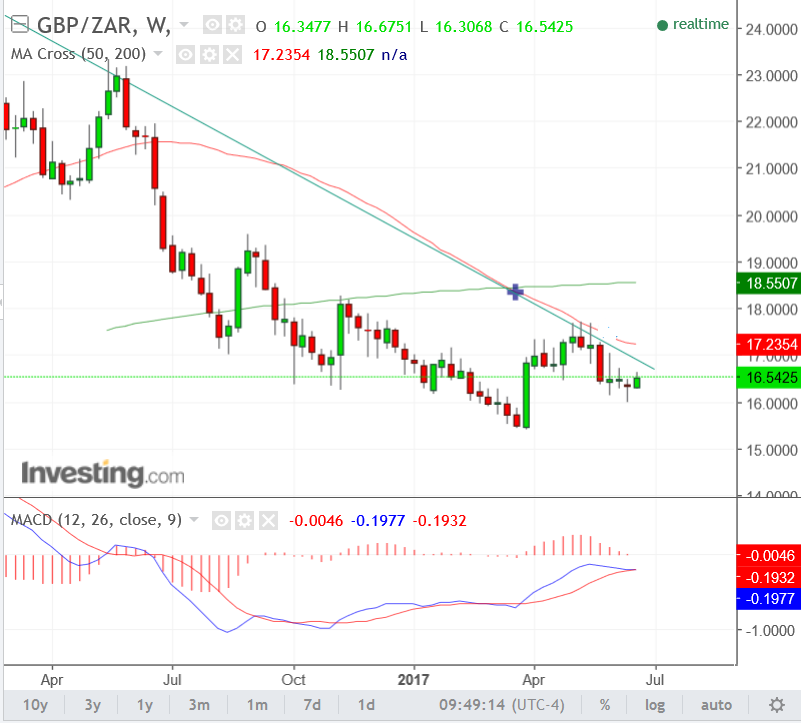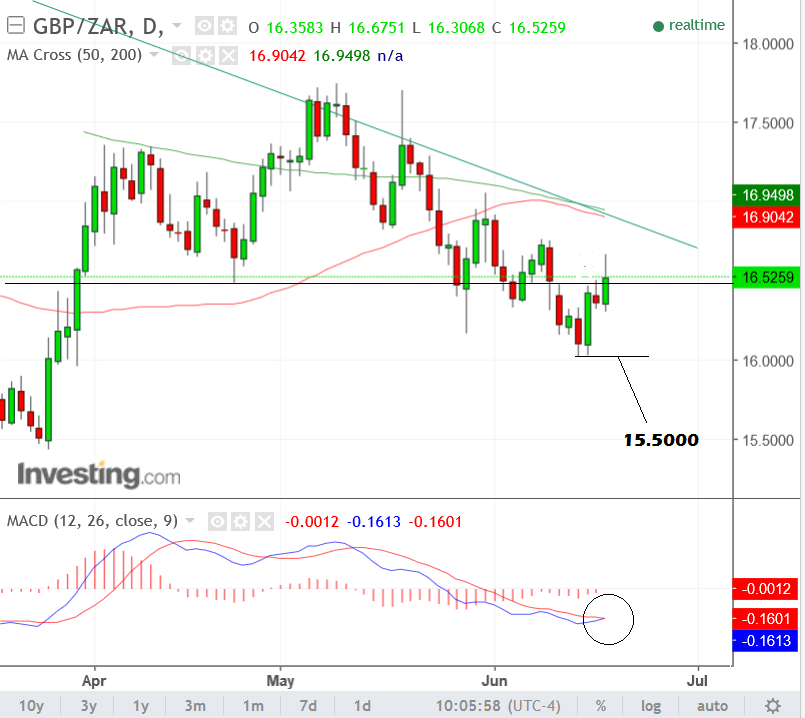South African Rand's Gains Halted by BEE Legislation, but Longer-Term Uptrend v Pound Intact

The Rand is falling against the Pound as political and economic risks weigh on the South African currency at the start of the new trading week.
Although these concerns have turned the outlook for ZAR negative over recent days, longer-term the Rand has been strengthening.
The long-view shows that the pair (weekly chart) has been contained under a major downtrend line:

The daily chart below shows the sequence of peaks and troughs has also reversed down in the short-term and is moving lower in what is now an established mini-downtrend, within the broader longer-term downtrend.
Despite recent signs of strength which are as a result of worsening Rand fundamentals, we still expect, on balance, the exchange rate to continue falling in line with the trend, and a break below the 16.0271 lows would lead to a continuation down to a target at 15.5000.

The Black Empowerment Mining Charter
The Rand has been pressured lower against all major currencies recently as a result of fears that outside investment will fall due to greater Black Employment Empowerment (BEE) rules in the mining industry, which it is feared, will put off investors.
“Locally, the release of the Mining Charter which raises the BEE ownership to 30%, from 26%, while requiring a 51% black shareholding in all new prospecting licences, put a stop to Rand gains,” says Rand Merchant Bank’s John Cairns.
“Mining stocks shed up to 10% last week and USD/ZAR lost 2% in response. The local unit opens at 12.80 this morning, after reaching sub-12.60 last week. The strong dollar, combined with continued media headlines related to the Mining Charter, makes us believe the Rand is biased for weakness,” added Cairns.
The Minister of Mines in South Africa has indicated that a new BEE Charter may raise the BEE equity commitment to 30% from 26% currently and also require miners to ensure that the 30% BEE commitment is in place even if previous BEE stakeholders have sold their shares.
The proposals appear to do little to address the underlying deals which enable BEE shareholders to acquire their stakes but sometimes pay little out to the BEE partners.
"There is a danger that the proposals may be seen as unworkable unless miners are able to completely lock in their BEE shareholders," says John Meyer at SP Angel.
Investors are concerned that the Minister of Mines may also impose further restrictions and costs on miners which are not currently required.
The South African Chamber of Mines is concerned that the Minister of Mines is trying to impose the new regulations unilaterally without discussion or any form of agreement with mining industry stakeholders.
Data for the Rand
From a data perspective, probably the most important release in the week ahead, is South African Inflation data for May out at 09.00 on Wednesday.
The data is expected to show headline inflation rising by 0.2% (from 0.1% in April), and by 0.1% for Core Inflation from 0.2% in April.
The South African Reserve Bank (SARB) will also release the leading indicator, which will likely show a weak performance, according to cairns.
Q1 Current Account data is expected to show a deepening of the deficit of -87.7bn Dollars, or -2.3% of GDP, when it is released on Tuesday morning at 09.00.
A deepening of then deficit would probably lead to greater Rand weakness.
Data for the British Pound
The main event of the week will be the start of Brexit negotiations on Monday June 19.
Britain's Brexit minister David Davis and the European Union's chief negotiator Michel Barnier will start negotiating Britain's departure starting a two-year divorce process due to end by March 2019.
Major issues that will be discussed in early talks will be the size of a "divorce" bill and the status of EU nationals and Britons living in the EU.





